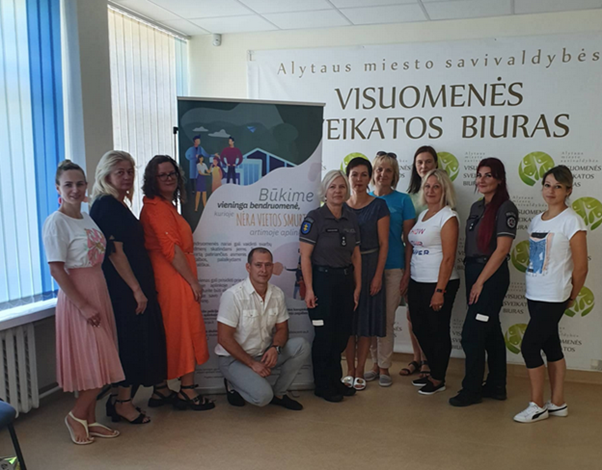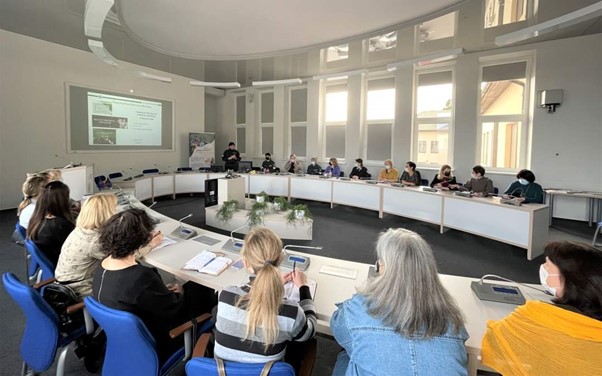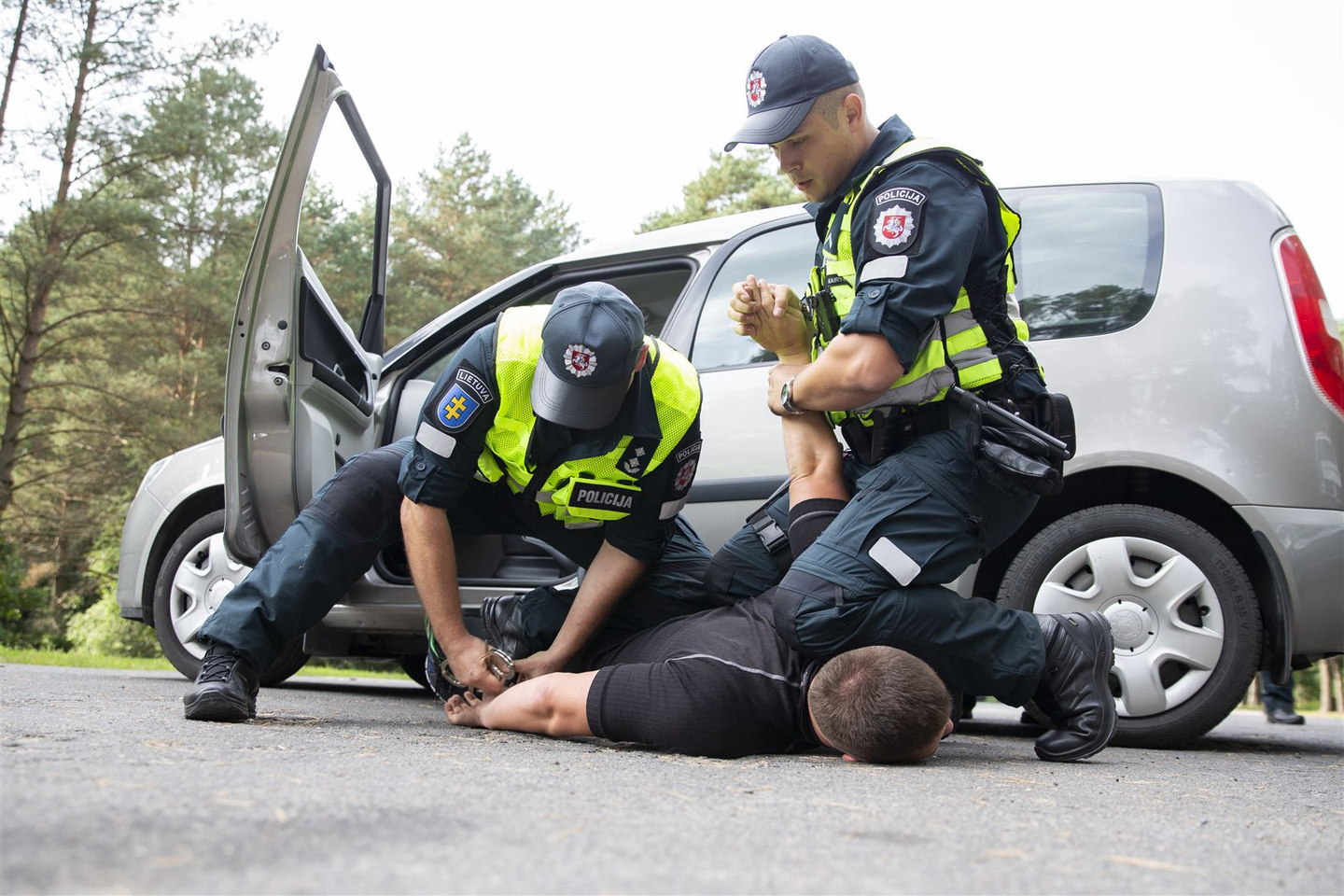Numbers tell stories. Domestic violence, predominantly against women, remains pervasive throughout the EU and is estimated to affect 1 in 3 women. When authorities are called to deal with domestic violence, every link in the chain — from police officers first on the scene, to investigators, prosecutors and judges — is vital. If one link is missing, the scales of justice teeter.
First responders have a great responsibility in the process toward justice. They gather the evidence and materials the prosecutors and judges need to do their jobs. And although these actions are essential, clear guidelines about how to hand over their work are often missing.

Uniting forces on the way to justice
One of the countries that is taking action to improve this workflow is Lithuania. It is the home country of a project called Improving Work Quality and Enhancing Competences of the Justice Chain to Protect Victims of Domestic and Gender-Based Violence. Funded under the EEA and Norway Grants Justice programme in Lithuania, this project brings together police, prosecutors, and national courts administration, and practising judges from all over the country to build a clear manual for professionals throughout the justice chain.

The Lithuanian teams are not alone in their activities, but are closely working together with the Norwegian police force. This country has been working with a special Risk Unit to improve the workflow, and their experiences are providing important insights about what does and what doesn’t work. The unique approach of sharing knowledge and expertise empowers teams in both countries to make better decisions and stand stronger in the fight against domestic and gender-based violence.
The project’s activities include:
- Defining the steps for the collection and evaluation of evidence
- Training professionals and representatives of NGOs
- Specialised training for police officers, community police officers and prosecutors
- Workshops to raise public awareness to promote a zero-tolerance approach to domestic violence in both Lithuania and Norway
Voices from the field
Since the start of the project in 2020, it has already achieved quite a few milestones. We asked two of the project heads - Ingrida Lamanauskienė from Lithuania and Renate Sætre from Norway - to tell us about their insights and experiences.
This project has quite a unique approach to the topic of domestic violence. Can you tell us something about it and your role in it?
Ingrida: I am responsible for the planning and roll-out of the activities. We are really focused on bringing the guidelines and methodology from our Norwegian partners into our practices. And especially getting all of the links in the chain (police, investigators, prosecutors and the judges) to understand each other’s tasks so that information is not lost and can be used for the best results.
Renate: I am a police superintendent currently based at the Stovner police station. I have been with the police service since 2015 and I was previously involved with similar projects as well. With domestic violence, we see that the very first response is important not only to protect and manage the situation, but also to get the necessary information and evidence to move forward. My role is to help build those links through our training and workshops.
So what is the situation, how do the numbers on domestic violence compare between Lithuania and Norway (and the EU in general), and what is the take away from the exchanges, workshops and cooperation?
Ingrida: The numbers are roughly the same all throughout the EU. Some 20% of calls to the police are for domestic violence cases. Domestic violence numbers are similar between Lithuania and Norway, but by sharing our methodologies and approaches, we can help fill the gaps and strengthen the chain from the beginning to end. In 2020, there was a spike related to Covid, where families were locked inside. And now there is a drop, but the numbers are comparable to those of 2019. So we still have a way to go.
Renate: Both in Norway and Lithuania (and globally) there is a tendency to pull back after the police receive the first call. We sometimes nickname this ‘the window of opportunity,’ which is right after the incident happens. The victim is more likely to talk to us on the spot. If we wait too long in the investigation, the window can close: the victim back peddles, either out of fear or under pressure from the environment. Underreporting is a known fact.
There is a ground-breaking law that will be applied coming this July 2023. It gives police the ability to immediately serve a restraining order when called to the scene of domestic violence. How is the force being trained to deal with the new tool?
Ingrida: Yes, so currently we (the police) must go through the prosecutor to get a restraining order, and that takes time. The new law gives police officers the right to directly impose a protection order, which can provide immediate assistance to the victims of domestic violence: it can help separating the victim from the perpetrator especially if there are children involved. All of the links in the chain can be activated in those 15 days of the restraining order and further violence can be blocked, while evidence is gathered and the situation can be evaluated. This is a big change, where we can count on push back from society, and challenges in court so to make sure it all happens correctly, we are onboarding 1,500 officers over the next 2 months. Ironically, the training was delayed during Covid lockdowns, but now, the urgency is useful and the training flow is condensed, and smooth.
And what about the introduction of body cams? The project allocates funding for numerous video camera units, to be used to both gather evidence, and protect police on the scene. These are not used in Norway, but Lithuania is getting ready to use them. Where is that particular part of the project at?
Ingrida: First responder video footage is important to link the process, from first responder all the way through, to give the investigator material, then prosecutor and judicial system. According to the Lithuanian law, we need admissible video footage that can be used as evidence in the court. It is crucial. It also protects the officers themselves. That’s why we’re excited that 1,800 units have been ordered.
The Risk Unit has now become a department in Oslo. That means that victims and perpetrators of violence have immediate assistance from a team of psychologists, police and social workers. Now the Lithuanian counterparts have been inspired to institute similar Risk Units. What have the results been in Norway and what is foreseen for Lithuania?
Renate: The Risk Unit is about prevention. But it’s hard to give actual numbers on its effects, because by preventing a situation, the statistics are zeroed out. We do know that over the last years, within the families that have been part of the programme, there have been no reported partner homicides afterward. This can be seen as proof that the strategy is working. But we know for certain when we see the long-term effects.
Ingrida: Learning about the Risk Unit was really a WOW moment for us: this holistic approach with a mix of police, social workers, psychologists that actually looks at the roots of domestic violence in total. That works with the victim and perpetrator to avoid recurrences and to really see what can be done in the future. We were surprised how deep the Norwegian police dive into the social aspects. The Risk Unit is unique, and we are excited to launch our own pilot for it.

This project is part of a bigger movement to tackle the problem of domestic violence, like the Risk Management Department in both Norway and Lithuania that helps keep the numbers off the charts. Prevention, follow up and support with social services and psychologists is encouraging the public to not only reach out in an emergency, but also stave off future incidents by giving victims confidence to pursue complaints with the hope of a just outcome.
Renate and Ingrida both emphasise that this holistic approach to domestic violence is of the utmost importance. Ingrida: “Getting everyone in the chain linked together only strengthens the approach. We are growing and moving forward. Sitting down at the same table gives us insight and power for the future.”
On July 9, 2020 a project promoted by the Oslo police department (under the Ministry of Interior) was signed to tackle the problem of domestic violence. The aim is to improve the policy of prevention of domestic violence in courts and law enforcement institutions, to strengthen competencies and inter-institutional cooperation in order to achieve effective division of functions and to prevent domestic violence.

